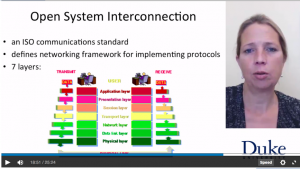Duke Learning Innovation partnered with Rachel Richesson, PhD, Associate Professor in the Duke School of Nursing to design a 10-week online course “Data Standards for Learning Health Systems” to engage professional learners in healthcare informatics.
Offered through the American Medical Informatics Association (AMIA) this professional development opportunity is part of the AMIA 10×10 virtual course program, targeted to biomedical and health informatics professionals. A certificate is issued for learners who complete the course with the required score. The course was recently offered by the Duke Center for Health Informatics and will launch again in Fall 2018.
Richesson discusses the significance of the project:
This was a learning experience that will serve Duke well as we explore other distance learning programs directed to prospective students or alumni, as well as to support Duke’s mission to positively impact the health of communities and populations.
Professional Development for Adult Learners
Learners included clinicians and health professionals from different hospitals and health systems across the United States. Working healthcare professionals enrolled from city health departments and federal agencies such as the U.S. Food and Drug Administration (FDA), National Institutes of Health (NIH) and the U.S. National Library of Medicine (NLM). In addition, clinician researchers with leadership roles in the Duke University Health System also took the course for professional development and a better understanding of issues related to data representation and exchange.
Data is a key component of learning health systems and the discipline of informatics can facilitate the seamless collection and continuous analysis of data required for organizations to continuously improve the quality of health care services delivered. – Richesson
Designing for Adult Learners
The online teaching approach was enhanced with learner-centered instructional design geared to the adult learner. This includes principles such as tapping into prior relevant experiences, using reflective observation, providing options for self-directed learning, and implementing real-world learning through project-based peer assessments. As part of the course activities, learners define a clinical question and the standards that support the application and evaluation of evidence in a health care setting.
It was exciting to see how the concepts and content taught in our academic programs could be adapted to non-traditional learners that are seeking to understand informatics concepts and apply them to real-world problems. – Richesson
Learner-Centered Design
Video approach: The course was developed in Sakai LMS and included modular, mobile-friendly content with 3-4 weekly videos of about 10 – 20 minutes each. Annotated lectures, use of green screen, on-location video, and expert guest interviews enhanced the learning experience. Learners appreciated the detailed orientation video and pre-readings to get acquainted with the course site and learning materials.

Learner engagement: Interaction took place in weekly discussion forums and optional WebEx live sessions (two offered). Learners commented on the usefulness of discussions and the engaged learning environment. In addition, attending an optional in-person session at the AMIA Annual Symposium in San Francisco and DC was offered for both sessions.
Having such a diverse class was also helpful to bridge the spectrum of learning healthcare systems. -learner feedback
Course Assessments
Learners commented on the value of the assignments, which included weekly narrative assignments and multiple-choice online tests. Students completed a final project and had the option of completing a final video based project individually or in a small group. The course was designed to offer relevant, real-world exercises, plus supplemental, self-directed homework and authentic, project-based activities, to connect students to real-world informatics experts.
Learner Satisfaction
Evidence of effectiveness in the design approach was gathered in the two-year aggregate qualitative and quantitative surveys distributed at the end of the course. Feedback points to learner satisfaction with course design, instructional video and digital media, platform and web conferencing tools, online activities, and the overall learning experience.
 Learners showed a strong preference for asynchronous forums, practical exercises, supplemental resources, and the opportunity to select among optional assignments.
Learners showed a strong preference for asynchronous forums, practical exercises, supplemental resources, and the opportunity to select among optional assignments.

Learner Feedback
The combination of the quizzes and narratives helped me think about the topic practically and theoretically. The practical exercises were the most helpful for learning important topics.
The main project was very useful and also group discussions. Additional real-world examples would always be helpful.
I am new to informatics and this was a wonderful introduction to the big picture as well as the practical tools and applications.
Project Team
This was Learning Innovation’s first online course developed in Sakai for working healthcare professionals in collaboration with multiple partners. The project was led by Sophia Stone and included Nicholas Janes (design lead), Sharon Updike, Department of Biostatistics and Bioinformatics, and Mich Donovan, video producers, Office of Information Technology.
The support of the Learning Innovation team helped me to identify strategies to present content, in this case a number of complex and often competing specifications for data standards -in a way that learners could apply them in their workplaces to advance the vision of “learning health systems.” – Rachel Richesson, PhD

